Entries tagged [washes]
Quick and Easy Painting with Washes, redux!
Posted on Thursday May 14, 2020 at 05:00pm in Tutorials
Not everyone has the time to spend paintstakingly blending, shading and detailing their models. Sometimes, you just want to get them on the table quickly, so I thought it might be useful to explore some options for fast and painless army painting.
My guinea pigs for this article are some Epirian Suppression Team models, painted exclusively with washes! This is a really easy technique to get to grips with, and while it won't get you an award-winning work of art, it does give you perfectly serviceable-looking models that look great on the table.
For those unfamiliar with them, washes are thin paints designed to sink into the model's crevices whilst leaving less colour on the raised detail (Also sometimes called 'inks' - Not to be confused with 'glazes' which are translucent paints that tint the surface they're painted onto evenly). So while it's a little less precise than blended highlighting or 'juicing' (applying super-thin coats of increasingly dark colour to build up shadow or colour transition), we can use washes over a pale base colour to highlight and shade a model all in one fell swoop. There are a wide range of different washes or inks available, but for this article I'm using Army Painter Quickshades.
I start by giving the model a base coat of white.
Now I'm going to start applying washes to build up the colours I want, leaving the model to fully dry between each. On this model, I've started with a coat of Soft Tone over everything except for the weapons. This is pale enough that other colours will go ok over the top - if you're using darker tones, it's best to try to keep them strictly on the areas where you want them, otherwise you'll need to touch up your basecoat to cover up the overspill before painting each part of the model. Apply a generous coat of wash and leave it to thoroughly dry before moving on to the next step.
Next, I've gone over the armour and chaps with Green Tone, and picked out the boots, belt, kneepads and weapons with Dark Tone. If the colour is lighter than you would like, you can let it dry and then add another coat, as I did with the Dark Tone - this isn't a particularly strong wash, so several coats were needed to get the weapons as dark as I wanted them. You can speed this process up by painting parts that you want to be really 'black' with a medium grey colour before using the wash, but for this article I just stuck with the wash by itself.
I left the tip and front facing of the Shock Baton free of the black wash, as once the black wash dried I applied a coat of Blue Tone to those, which gives a nice energy-glow effect over the white. I also went over the exposed skin areas with Flesh Tone. At this point, I also stuck some sand to the base with PVA glue, washing it with a coat of Strong Tone once the glue dried. Then, to finish up, a quick coat of black around the base edge - you could skip this step by masking off the base edge with tape before painting and then just peeling the tape off at the end.
You can vary the look of the washes by using different base coats. The model below was painted using the exact same process as above, but over a bone basecoat instead of the white.
If you prefer a little more detail, you can go over the washed model with regular paint, picking out features like eyes, belt buckles and the like, and of course you can use different wash colours to suit your preferred colour scheme.
Why not give it a go? As always, feel free to share efforts, or ask any Maelstrom's Edge- or hobby-related questions on the Comm Guild Facebook page!
You can pick up the Epirian Suppression Team, along with the rest of the Maelstrom's Edge model range from the webstore here.
For other Maelstrom's Edge modeling articles, including tutorials and walkthroughs of a wide range of different building and miniature projects, check out the Hobby section of the Maelstrom's Edge website here.
Tags: epirian painting tutorial walkthrough washes
Quick and Easy Painting with Washes
Posted on Monday Oct 17, 2016 at 05:00pm in General
![]() - by Iain Wilson
- by Iain Wilson
Not everyone has the time to spend paintstakingly blending, shading and detailing their models. Sometimes, you just want to get them on the table quickly, so I thought it might be useful to explore some options for fast and painless army painting.
I'm going to start with some Epirian guinea pigs, painted exclusively with washes! This is a really easy technique to get to grips with, and while it won't get you an award-winning work of art, it does give you perfectly serviceable-looking models that look great on the table.
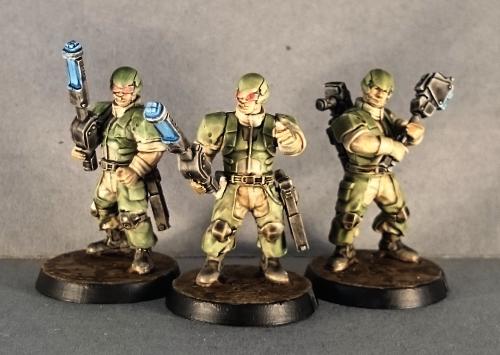
For those unfamiliar with them, washes are thin paints designed to sink into the model's crevices whilst leaving less colour on the raised detail (Also sometimes called 'inks' - Not to be confused with 'glazes' which are translucent paints that tint the surface they're painted onto evenly). So while it's a little less precise than blended highlighting or 'juicing' (applying super-thin coats of increasingly dark colour to build up shadow or colour transition), we can use washes over a pale base colour to highlight and shade a model all in one fell swoop.
I start by giving the model a base coat of white.
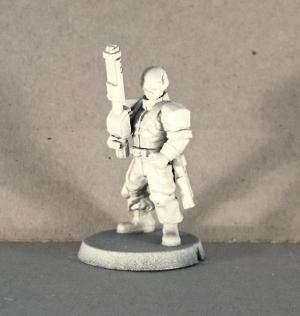
Now I'm going to start applying washes to build up the colours I want, leaving the model to fully dry between each. On this model, I've started with a coat of Army Painter Soft Tone over everything except for the weapons. This is pale enough that other colours will go ok over the top - if you're using darker tones, it's best to try to keep them strictly on the areas where you want them, otherwise you'll need to touch up your basecoat to cover up the overspill before painting each part of the model. Apply a generous coat of wash and leave it to thoroughly dry before moving on to the next step.
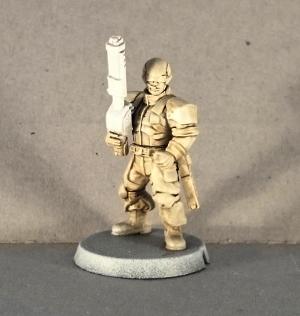
Next, I've gone over the armour and chaps with Army Painter Green Tone, and picked out the boots, belt, kneepads and weapons with Secret Weapon Soft Body Black (this has a little more pigment in it than most other black washes I've tried, so is good for painting over pale colours without needing half a dozen coats to build up shading).
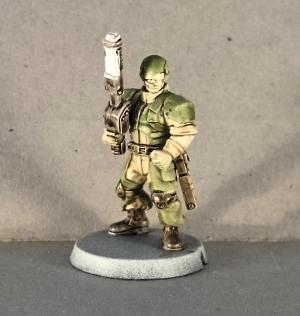
I've left the tip and front facing of the Shock Baton free of the black wash, as once that layer of wash is dry I have applied a coat of Army Painter Blue Tone to those. I've also gone over the exposed skin areas with Army Painter Flesh Tone, and painted his goggles with Army Painter Red Tone.
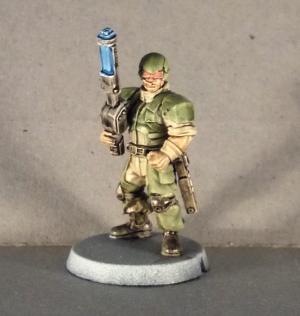
For a final step, I gave his weapons another coat of black, and detailed the base. I've gone for a cracked earth look on the base, just for something quick. There are specialist paints out there for doing this sort of thing, but this one was done with regular paint and wood glue - I'll be posting a tutorial on how to do that later on.
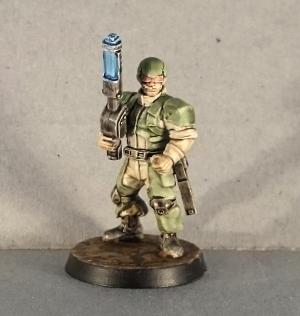
At this point, the model is ready for the table. You can add extra detail if you feel like it, and of course you can use different wash colours to suit your preferred colour scheme.
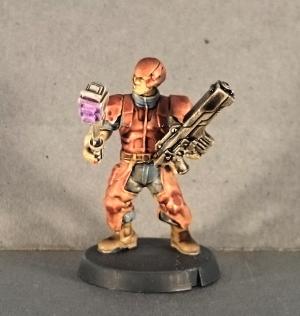
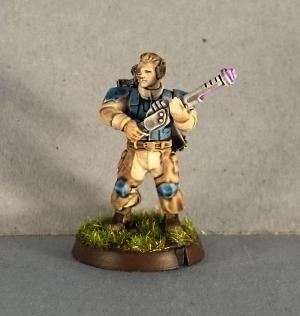
Go ahead and give it a try, and feel free to share your creations on the Comm Guild Facebook page (https://www.facebook.com/groups/MaelstromsEdge)!
Tags: expansionsprue painting washes